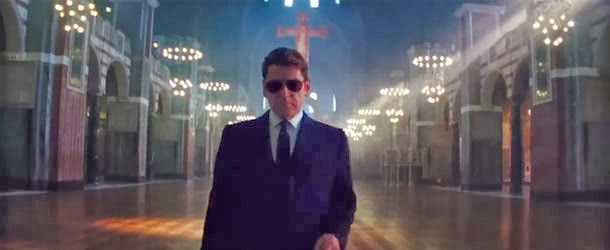or
Remember Your Trade-craft and You'll Be Fine.
Tom Clancy's most-read hero, Jack Ryan, has been all manner of things in the books—economics student, CIA analyst, Deputy Director of the CIA, and President of the United States (Hey! It could happen—especially in a Clancy novel!). When asked who should play Ryan in the movies, Clancy would answer jovially "Me!" and then demur to the latest Hollywood hunk, as long as he wasn't a liberal.
Ryan was Clancy's fantasy-ego and he'd regularly grouse about the movies made from his books (what authors don't, but when Clancy was asked to do commentaries for the DVD releases, he was always entertaining, enlightening, and for the most part, charitable). Alec Baldwin darkened his hair and manned up to play Ryan in The Hunt for Red October (showing off his proclivities for mimicry—his Connery imitation is hilarious). When Baldwin made a sequel tougher to negotiate, the producers turned to Harrison Ford, an actor always good for holding up a tent-pole, to do the next two. Then, came time to reboot the franchise with a younger actor, Ben Affleck took over in The Sum of All Fears and re-tread some of the same Ryan-ground from the first movie. Now, approximately twelve years after TSOAF, the Clancy-verse gets its second reboot with Jack Ryan: Shadow Recruit as Chris Pine portrays Ryan, going even further back with more depth into Ryan's past.***
 |
| Sample Dialogue: "You Americans think you're direct. Perhaps you're just rude." "You Russians think of yourselves as poets. Maybe you're just touchy." Oooh, sna...wait...WHAT? |
Maybe it's me for thinking that a Tom Clancy movie with no basis in Tom Clancy would make a good movie. Now, granted, I'm not the biggest fan of his work, finding him technically gee-whizzy, but his characterizations flat; he's got the spread-sheets and the blue-prints, but his characters are stamped on cardboard. He's a step below Michael Crichton in the character development department. That's where the movies (at least, initially) did Clancy a service in translation. The actors fleshed out the intel and even offered some intrigue in between the jargon. Here, there's not much of that as much as back-story, and a constant harping on Ryan's domestic issues in conflict with his secret duties. The actors try very hard—Pine more than necessary, Keira Knightley does as much as she can in a "victim" role, and Kevin Costner is suitably unreadable as Ryan's boss-mentor-cheerleader.
Kenneth Branagh directs (and acts the chief villain, a Russian capitalist specializing in insider-trading) and seems content to keep the action moving swiftly and the interiors filled with negative space and not much else. Gone are the days of the ingenuity of his Shakespeare adaptations and scruffy curiosities like Dead Again and Peter's Friends. JR:SR is all about the architecture and how things move through them, then when things get rough they switch to second-unit mode where Vic Armstrong (as he was for the battle scenes in Branagh's feature debut Henry V) is in charge. Armstrong is one of the best in the business, but, he seems to be falling victim to the current trend of action film-making—to make it as incomprehensible as possible. Broken back aside, there are absurdities going on here that would strain credulity, if one could fathom just what was going on, and determine where people were in relation to those events. There's some lip-service given to GPS tracking, but most of the time, the action feels a little lost and chaotic to no good point other than to convey chaos. These things can be done better and Armstrong has done them better in the past. Everything about this one seems diminished, as far as scope, reach and execution, but it may satisfy those looking for a diversion or for fans of the participants. If you're not looking too closely, Branagh's Jack IV is okay. But it's no Henry V.
Jacks or Better to Open: Ben Affleck, Harrison Ford and Alec Baldwin
* Interestingly, Ryan joins the Marines after the events of 9-11, which was only a few months before the premiere of The Sum of All Fears.
** One should also mention Ryan's doctor-wife portrayed by in order Gates McFadden, Anne Archer, Bridget Moynahan, and now, Keira Knightley.





No comments:
Post a Comment